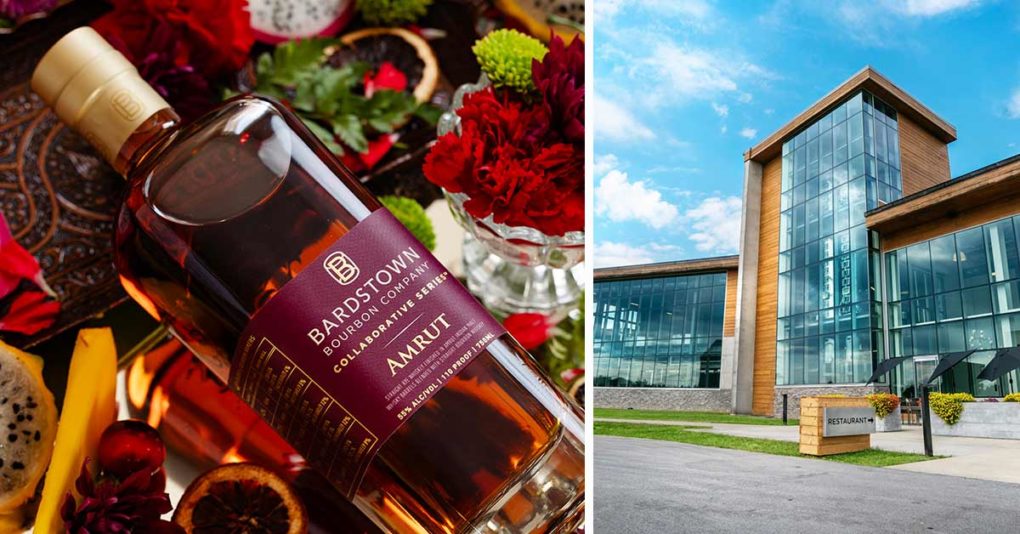
Walking, in this instance, means contract distilling for renowned whiskey brands, acquiring another distillery, and releasing its own bourbon series. With Marino steering the ship alongside a new c-suite, it’s full-steam ahead as the company continues to diversify its own roster of brands, while bracing for competition in the whiskey contract space.
Bardstown Bourbon is among a small but growing group of contract distillers for other brands, but its collaborative services and mashbills were so unusual to the industry that when it opened in 2014, it sold out of its custom capacity before it had even started production. The distilling program with over 50 unique mashbills now represents one of the top distilleries by volume in the U.S. and produces bourbon for names like Jefferson’s, High West and Cyrus Noble.
In March 2022, Bardstown Bourbon was purchased by Pritzker Private Capital, a move from one of America’s wealthiest families underscoring the recent wave of interest from private investors and strategics in Kentucky’s signature spirit. A few months later, Bardstown Bourbon acquired Kentucky-based peer Green River Distilling Co, including the historic Green River Spirits Co. facility in Owensboro (the tenth oldest distilled spirit production license in Kentucky), and a much newer spirits production facility in Charleston, South Carolina.
In addition to more distilling capacity, it may have given Bardstown Bourbon the edge it will need to compete with other major bourbon producers: diversity.
Building On Duality
After years of collaborating on liquid for others, last year Bardstown Bourbon released its own brand called the Origin Series, 100% distilled by the company’s famed master distiller Steve Nally. The company also recently debuted another edition of its Collaborative Series, which partners with innovators in whisky, wine and beer.
“We have the best of what’s new with Bardstown and this deep authenticity, heritage-soaked brand in Green River,” said Marino. “This duality is something that is pretty interesting for us and we feel very positive about both brands and how we’re continuing to incubate and grow them.”
The portfolio also represents a range of price points from Green River at $34 to the Collaborative series which tops $100.
“From a portfolio management standpoint we don’t have brands that are sitting on top of each other in the pricing tiers,” Marino added.
The new sales and marketing teams are now “really focused” on expanding the intensity behind the Bardstown Brands, led by Origins and the Green River labels, said Marino. As the company aims to expand its national footprint, it has also recently added three newly created VP roles within the sales organization. Bardstown Bourbon Co. recently added Andrew “Max” Walker as group brand director, who previously served in leadership roles for companies like Proctor & Gamble and Molson Coors.
Marino’s own path with the brand has come full circle after originally coming to Bardstown Bourbon as a customer to create the Coors Whiskey Co brands in 2021. He took a senior advisory role with the Pritzker family’s investment firm after leaving Molson Coors in 2023 where he was president of the emerging growth division, leading the company’s non-alcoholic beverages like ZOA energy drink. Now, he’ll have to apply that experience to shepherd Bardstown’s own emerging brands without losing sight of competing in the contract whiskey space.
Contract Distilling Business Shifts with Bourbon Boom
Perhaps the best known source for whiskey in the industry (and the least known to consumers) is MGP, an Indiana distillery that has produced finished goods for labels like Smooth Ambler, WhistlePig, Bulleit, and others. Touting the “Kentucky straight bourbon” and offering a custom mashbill program has been Bardstown Bourbon’s competitive edge against the much larger MGP, which only offers a dozen standard mash bills, and only recently has made its terms more flexible for smaller distillers.
But MGP has also expanded recently into its own lines, Rossville Union and George Remus, pointing to how other contract distillers are increasing revenue streams via consumer brands. Add to it MGP’s $475 million acquisition of St.Louis-based spirit producer Luxco in 2021, which acquired Penelope Bourbon for $105 million upfront last year.
The American whiskey boom has inspired more distillers to seek out customization services and MGP acknowledged in 2020 that the number of potential competitors for sales of volume distillate had increased. Bardstown Bourbon now has more competition offering similar services as well: the Whiskey House of Kentucky founded by Bardstown Bourbon veterans, for instance, is a cutting-edge facility set to open July 2024 that will focus entirely on large-scale contract whiskey production. Craft distillers are also contracting more, while third party investors are buying and flipping barrels. But Marino says their distilling business is healthy.
“We added a third still last year to our facility in Bardstown and we did that because of the demand,” he said.
There’s another changing aspect of the bourbon industry that Marino is charged with investing in
“Hospitality is a huge part and a growing part of how we show up in the world,” he said.
The company’s visitor experiences have three distinct sites: Green River on the western edge of the Bourbon Trail, Bardstown Bourbon, and last year’s addition of a downtown Louisville tasting room on the Urban Bourbon Trail. Marino argues that it’s Bardstown Bourbon’s unique, modern facility that has helped the brand build a reputation among bourbon enthusiasts, which helps as it moves more of its own labels onto the shelf. He’s also convinced the Bourbon Trail will continue to evolve.
“There’s a lot more ancillary services that are being created in and around the Bourbon Trail, new hotels being built, new restaurants being opened, new transportation and logistic opportunities,” he said. “I think you’re gonna continue to see a maturation of Bourbon Trail tourism, and we’re gonna play a role in it.”